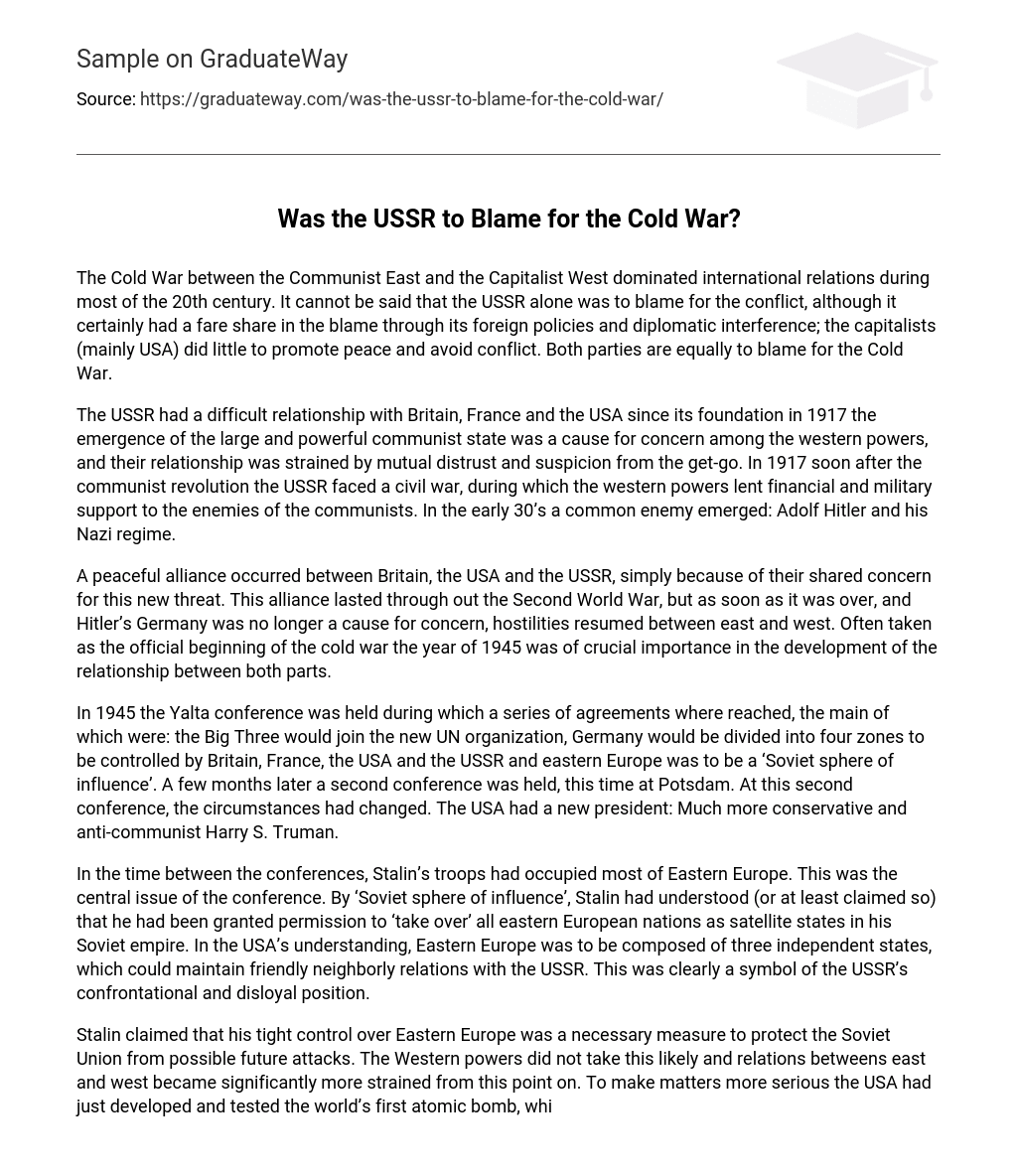The Cold War between the Communist East and the Capitalist West dominated international relations during most of the 20th century. It cannot be said that the USSR alone was to blame for the conflict, although it certainly had a fare share in the blame through its foreign policies and diplomatic interference; the capitalists (mainly USA) did little to promote peace and avoid conflict. Both parties are equally to blame for the Cold War.
The USSR had a difficult relationship with Britain, France and the USA since its foundation in 1917 the emergence of the large and powerful communist state was a cause for concern among the western powers, and their relationship was strained by mutual distrust and suspicion from the get-go. In 1917 soon after the communist revolution the USSR faced a civil war, during which the western powers lent financial and military support to the enemies of the communists. In the early 30’s a common enemy emerged: Adolf Hitler and his Nazi regime.
A peaceful alliance occurred between Britain, the USA and the USSR, simply because of their shared concern for this new threat. This alliance lasted through out the Second World War, but as soon as it was over, and Hitler’s Germany was no longer a cause for concern, hostilities resumed between east and west. Often taken as the official beginning of the cold war the year of 1945 was of crucial importance in the development of the relationship between both parts.
In 1945 the Yalta conference was held during which a series of agreements where reached, the main of which were: the Big Three would join the new UN organization, Germany would be divided into four zones to be controlled by Britain, France, the USA and the USSR and eastern Europe was to be a ‘Soviet sphere of influence’. A few months later a second conference was held, this time at Potsdam. At this second conference, the circumstances had changed. The USA had a new president: Much more conservative and anti-communist Harry S. Truman.
In the time between the conferences, Stalin’s troops had occupied most of Eastern Europe. This was the central issue of the conference. By ‘Soviet sphere of influence’, Stalin had understood (or at least claimed so) that he had been granted permission to ‘take over’ all eastern European nations as satellite states in his Soviet empire. In the USA’s understanding, Eastern Europe was to be composed of three independent states, which could maintain friendly neighborly relations with the USSR. This was clearly a symbol of the USSR’s confrontational and disloyal position.
Stalin claimed that his tight control over Eastern Europe was a necessary measure to protect the Soviet Union from possible future attacks. The Western powers did not take this likely and relations betweens east and west became significantly more strained from this point on. To make matters more serious the USA had just developed and tested the world’s first atomic bomb, which would set the tone for the rest of the Cold War. Within four years the Soviet Union would develop its own atom bomb and relations between east and west would be overshadowed by the threat of nuclear warfare at any moment.
In 1946 Winston Churchill coined the phrase “Iron Curtain” to describe the rupture the world was experiencing. There was clearly a very definite division in the World; the Berlin wall divided that city, which would serve until the end of the war as the symbol of the division of the world. Germany was a divided country in a divided continent, in a divided world. From this point on the relationship between communists and capitalists would grow increasingly hostile.
In the next few years Stalin would continue to tighten his grip in Eastern Europe, using military force to impose governments run by loyal subordinates of his . A propaganda war raged for many years went hand in hand with a heated arms race, and later a space race. In 1947, with the Truman doctrine and Marshall aid, the USA made no secret of its plan to contain the spread of communism by tempting Eastern European states with money and imported goods. The Berlin blockade and airlift sealed the deal definitively; eliminating any doubts anyone may have had that there was an extremely hostile was going on.
In conclusion, I believe that, while the USSR was aggressive and sneaky in its foreign policies, and clearly ignored the wishes of the west, going ahead and building a Soviet empire, the western powers, but mainly the USA are also to blame, for they did little to avoid further conflict, and indeed deliberately worsened relations with the USSR by constantly confronting and provoking the communists in a number of ways. I believe either party was in a position to end the conflict, but neither did. Fabricio Rocha





